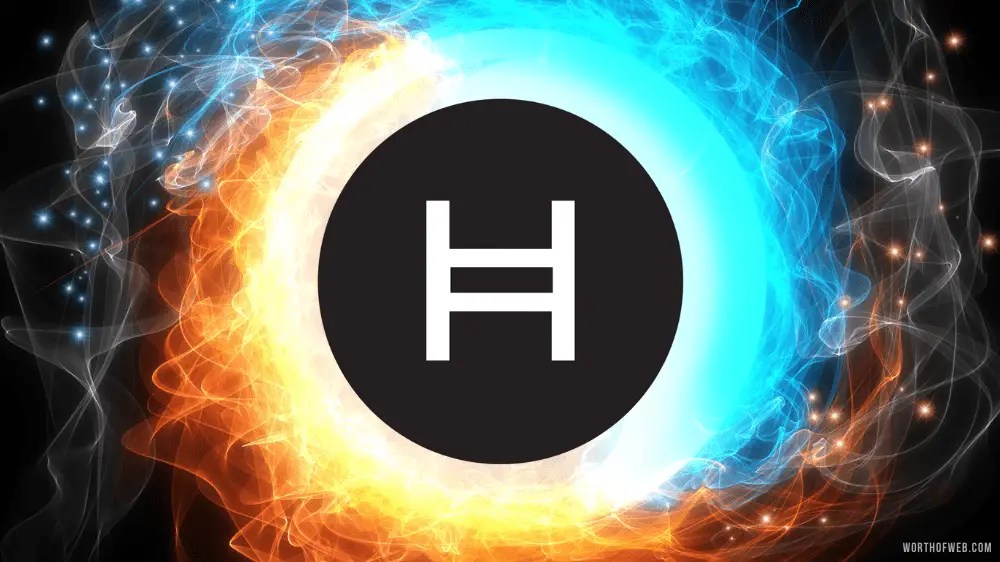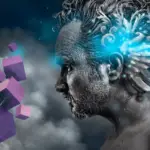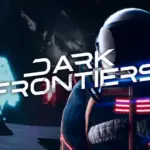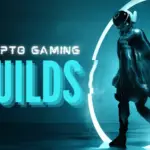Last updated on March 2, 2022. Are you following Socratoshi Nakaplato on Twitter?
Are you a Star Wars fan? If so, you know the prophecy of the Chosen One who will bring balance to the Force. Although there are different interpretations online, we think that Anakin Skywalker brought balance to the Force in the end.
His master Obi-Wan Kenobi said to him after he joined the Dark Side, “You were the Chosen One! It was said that you would destroy the Sith, not join them! Bring balance to the Force, not leave it in darkness!”
It happens not just in movies or literature. The change comes in the end but as humans, we can’t understand the path to it beforehand. We tend to simplify our surroundings and draw a straight line from point A to B.
However, we are complex, life is complex, the world is complex, and technology reflects that. We talked in detail about Web 3.0, web oligarchy, web democracy, and our hunger for the change in our What is Web 3.0? post. We described how big corporations lost the balance and became oligarchs of the web.
When you make a quick search about Hedera, it seems like the very corporations we try to escape with decentralization control this Proof-of-Stake Layer 1 solution.

There are stereotypes and taboos within crypto communities. When the community sees a corporate logo, they quickly label a project as centralized. This prejudice does not help Hedera. Influencers and even founders of other blockchain projects judge the book by its cover.
Hedera might be the Chosen One that will bring balance to the web. Although it seems counterintuitive at first, just like Anakin, the governance model of Hedera can be the path to true decentralization.
Dr. Leemon Baird and Mance Harmon, the founders of Hedera, have a vision. They want to build a company that will be around for 100 years. It is a bold statement in a market where no one can predict what will happen next month.
What does it look like to be on a 100-year journey? How do they approach this hype-driven market? Can Hedera beat the Blockchain Trilemma and Blockchain Tetralemma? We will try to answer these questions in this article.
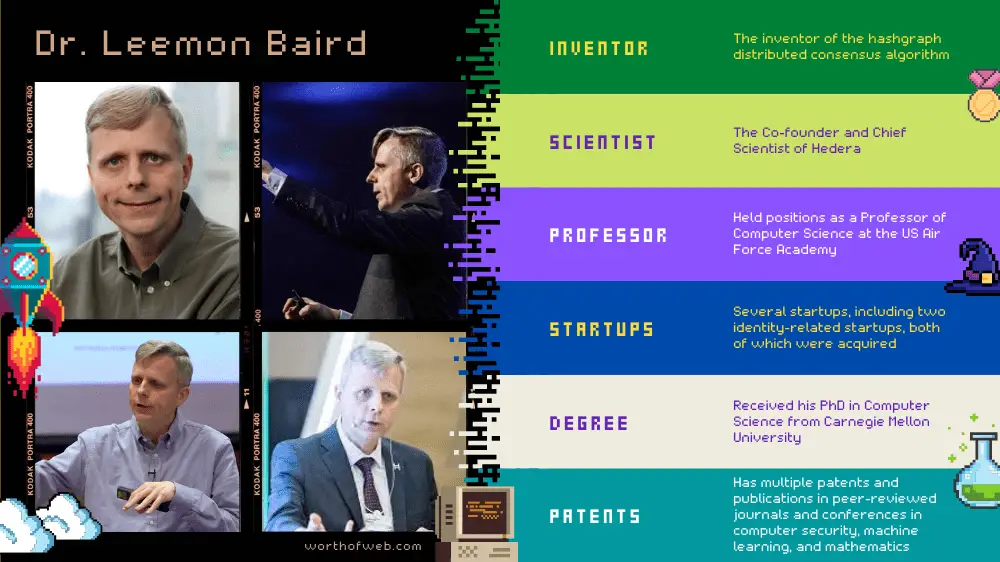
Before we dive into different aspects of the project, we need to say that Hedera is a sophisticated ecosystem. It is not possible to cover everything in one blog post. We just want to show you the doors. You can find a lot on their website, Twitter, YouTube, and other channels. Don’t forget to check Reddit discussions. Feel free to complete the missing points in the comment section below.
Decentralization
Power wants more power, and decentralized becomes a mask for a centralized power concentration.
In a PoW (Proof of Work) system, miners themselves or the countries who host the mining can be the point of concentration. In other systems, whales, VCs (venture capitalists), and other entities with deep pockets can control the majority of the system anonymously.
Although it may seem that thousands of software developers are contributing to the code base, only a handful of developers make the important decisions for a lot of blockchain projects.
At the user level, anonymity is critical for a DLT (Distributed Ledger Technology) like Hedera but anonymity is a double-edged sword at the governance level.
How does Hedera approach this problem? Dr. Leemon Baird explains in the video below:
At the time of writing, 26 of 39 seats are filled in the government council of Hedera. Swirlds, the creator of hashgraph, has a permanent seat (one of 39) and an equal vote.
The council members own and manage the network. The 39 members will be distributed fairly across time, region, and industry.
Dee Hock’s book, “One from Many: VISA and the Rise of Chaordic Organization“, was the inspiration for the Hedera Governing Council. This book shaped the vision of Harmon and Dr. Baird while they were discussing how to form a decentralized governing council that would ensure ongoing decentralization at scale.
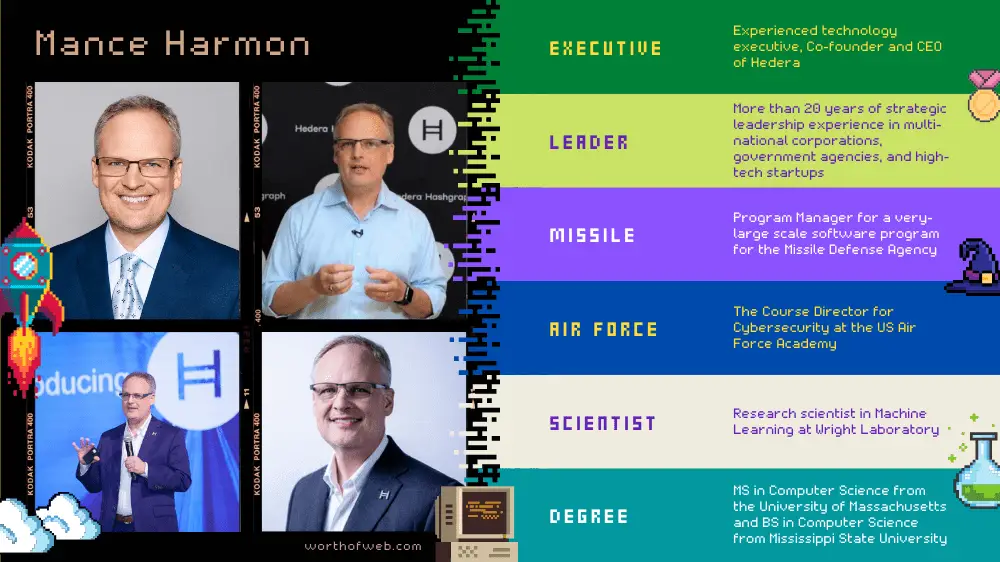
We need to mention the Facebook Libra “incident” here. Summary of the events: Hedera had a meeting with Facebook to share Hedera’s vision (Feb 2018); Facebook announced the Libra Association (Jun 2019); Hedera placed the ad below in the Wall Street Journal (Jun 2019). Check the blog post of Mance Harmon about Facebook Libra. You can read the related news here, here, and here.

While each council member is committed to network innovation, stability, and its continued decentralization, they are not there indefinitely. All members have a three-year maximum term, with up to two consecutive terms. This creates decentralization in the time dimension.
This model comes with transparency. They regularly share what happened in Hedera Council meetings. You can view all council meeting minutes on their website. It is possible to verify each PDF on that page because meeting records are immutable and can be proved using the Hedera Hashgraph Protocol.
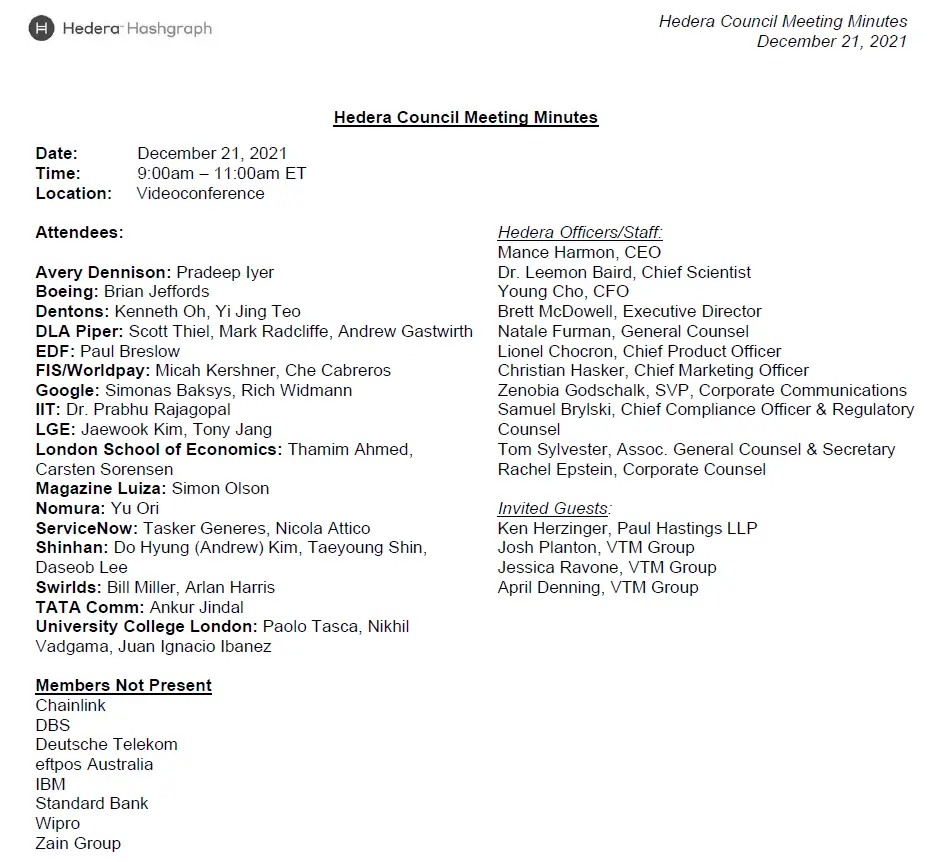
In this setting, can you imagine that Google will call IBM and LG, and organize a “rug pull” behind closed doors? They would not care. In that sense, it is decentralized in the reputation dimension.
We said that people judge the book by its cover. However, the roadmap of Hedera and its path to decentralization have shown the long-term plans of the network from the start.
There are security concerns at the early stages for these types of DLTs. They created this path to make the transition to a fully decentralized public network successfully and securely.
Their patent and open-review approach was criticized by many. Recently, the Hedera Governing Council has voted to purchase the intellectual property rights to the hashgraph consensus algorithm from Swirlds, Inc., the original creator of the hashgraph consensus algorithm and founding member of the Hedera Governing Council.
The Governing Council members further made a commitment to make the code open source under Apache 2.0 license. They will be making important structural changes in the development processes accordingly.
Check the blog post about this important milestone or watch the video below. The first 4 minutes of the video summarize the journey of Hedera so far:
Is Hedera the trilemma killer?
What is blockchain trilemma? The main goal of the current blockchain projects is to provide decentralization, security, and scalability all at once. While many projects claim that they solve all these problems, in reality, most of them can only handle two of these three aspects. This leads to the blockchain trilemma. Check our Blockchain Mythology: Trilemma & Tetralemma post to learn more.
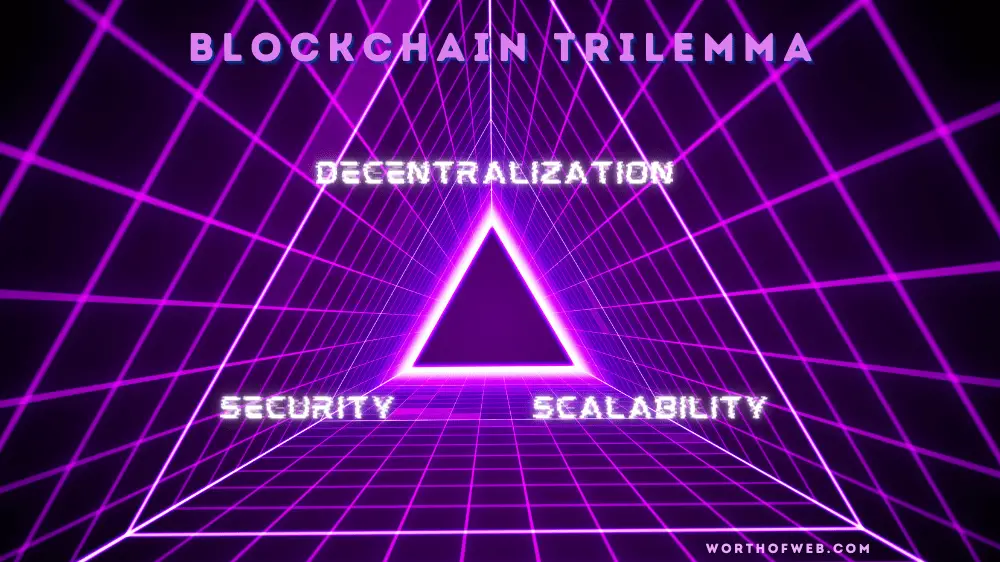
Miners need to use their computing resources to overcome the difficulty adjustments in the Bitcoin network (check Luck, Gambling, and SHA256 analogy to understand better). The Bitcoin network has to create this artificial problem to be secure. If we ignore the concentration of mining in a region or at the hands of some hardware owners, we can say that Bitcoin is decentralized. Bitcoin became a store of value but scalability is not there. So, trilemma vs Bitcoin? Trilemma wins, Brutality.
The blockchain trilemma, as coined by Vitalik Buterin himself, is a big problem for Ethereum as well. That’s why Layer 2 projects that focus on scaling are growing so quickly. That’s why Ethereum needs a 2.0 so badly. Trilemma vs Ethereum? Trilemma wins, Fatality.
We checked the decentralization corner for Hedera in the previous section above. What about scalability?
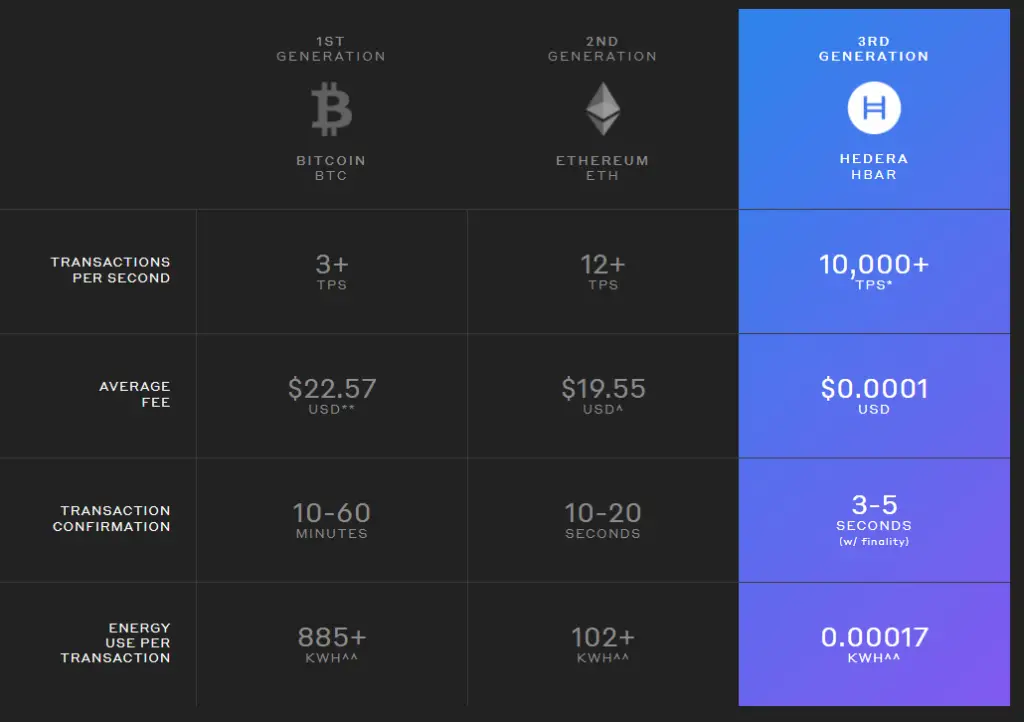
We will talk about transaction fees and energy usage in the next sections. Here let’s focus on TPS (transactions per second) and finality time.
While many networks suffer from a lack of speed, Hedera TPS is throttled (yes, decreased on purpose) at 10k and they are able to increase it easily in the future. They tested hundreds of thousands of TPS in a single shard successfully. With sharding, they can enable unlimited TPS. Besides, they optimize the network to keep the finality time around 3-5 seconds.
DLT > Blockchain > Bitcoin
DLT > DAG > Hedera
Bitcoin uses a blockchain. Blockchain is just one type of DLT (Distributed Ledger Technology). All blockchains are distributed ledgers, but not all distributed ledgers are blockchains.
Hedera uses a DAG (Directed Acyclic Graph). DAG projects are DLTs that work with a graph instead of a chain of blocks.
How can Hedera create so much difference technically? What does Hedera have, the others don’t?
Hashgraph has entered the chat.
Since it is a complex concept, it is best understood with animations. The inventor of the Hashgraph Algorithm, Dr. Leemon Baird explains in the video below:
These graph of hashes, gossip about gossip protocol, and virtual voting make the hashgraph unique. This algorithm puts Hedera a couple of steps ahead of its competitors technically.
The third corner of the triangle above, security.
The way the hashgraph algorithm works, the design of the overall network, and the operational structure of the network make it an enterprise-grade public network. Hedera network is asynchronous Byzantine Fault Tolerant (aBFT) which is the highest grade of security possible in this industry.
Asynchronous Byzantine Fault Tolerance (aBFT) is a property of Byzantine fault-tolerant consensus algorithms, which allow for honest nodes of a network to guarantee to agree on the timing and order of a set of transactions fairly and securely.
Understanding the decentralization and scalability might be easier but security talks will be mumbo-jumbo for the majority of the people. Many projects are aware of this lack of knowledge and market their blockchain project as “UltraBFT”, “MegaBFT”, etc. While their packaging is good, their security level is simply not enough.
When Hedera says aBFT, they mean it. Ask all these governing council members and other organizations that trust in the Hedera system by building their mission-critical applications on this network. You can imagine the amount of due diligence before starting a multi-year multi-million project.
If you want to entertain your inner nerd, and ask one of these Byzantine generals “Dude, what’s your problem?”, check the video below:
Hedera has obvious technical advantages. Their weakest part is the decentralization, or is it? Let’s say it the right way. The community “perceives” their decentralization differently. When you look closely, it is clear that they do everything according to a plan. By design, they started differently, and they have been following the signal in an environment where everyone is creating noise.
Trilemma vs Hedera? If they continue to play their cards right, Hedera wins, Friendship.
HBAR
HBAR is the native cryptocurrency of the Hedera public network. It has a total fixed supply of 50 billion coins.
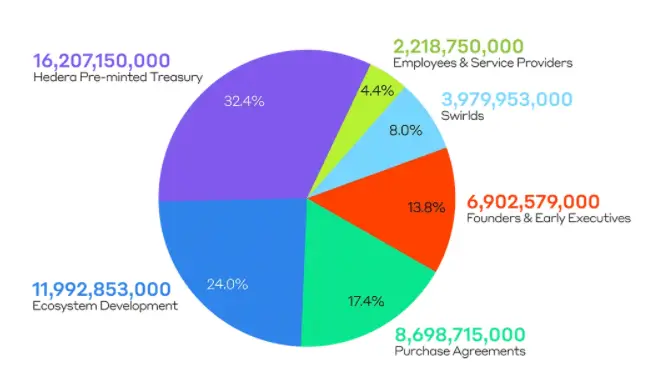
HBARs are used to pay for network services, power decentralized applications, and protect the network from malicious actors.
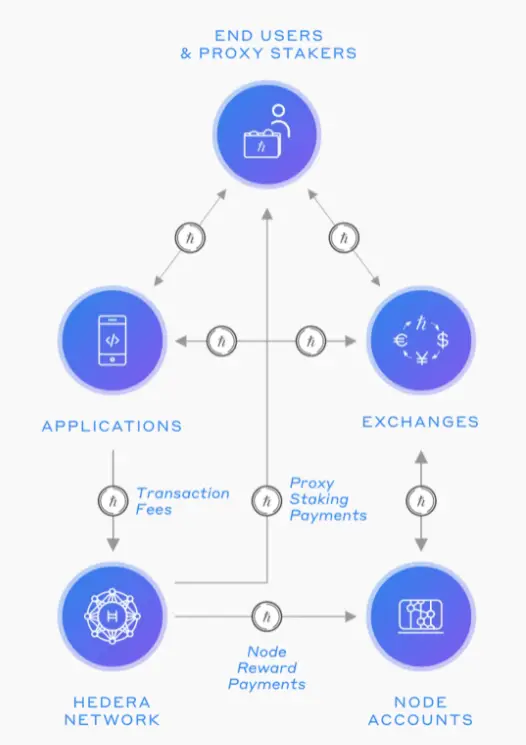
You can buy HBAR coins on exchanges like Binance, KuCoin, Bittrex, Huobi, Crypto.com, Upbit, and more.
Let’s check the charts for the price, market cap, and market dominance of HBAR. Market dominance is the ratio of HBAR market cap to the total market cap of all cryptocurrencies.
People make the mistake of comparing the prices (or total supplies) of two coins. Comparing the price of Bitcoin, Ethereum, etc. to the price of an HBAR coin is meaningless. We talked about this in detail on the Market Overview > Price Charts page of our website. Since total supply is an arbitrary number (e.g. 50B for Hedera) that is determined by founders during the minting process, each project has varying supplies and prices. So, our best tool for comparisons is the market cap.
With that in mind, let’s compare the market caps of major Layer 1 solutions with the market cap of Hedera. We picked Ethereum (ETH), Cardano (ADA), Solana (SOL), and Avalanche (AVAX).
What about other DAG solutions? We can compare the market cap of HBAR with the market caps of Fantom (FTM), IOTA (MIOTA), Constellation (DAG), and Nano (XNO).
Network Services
We checked the core features of the network above. We fought with the Trilemma Monster. Now, we have HBARs in our pockets. How to build something on this network?
Hedera provides 4 main services: Token Service, Consensus Service, Smart Contract Service, and File Service. Developers can use JavaScript, Java, and Go to connect to the network.
Hedera Consensus Service (HCS): You can record immutable, verifiable, and fairly ordered event data for any application or permissioned blockchain framework. Useful to track assets across a supply chain, create auditable logs of events in an advertising platform, or even use it as a decentralized ordering service.
File Service: You can store smart contract byte code, address books, credentials, and other critical files on the Hedera network.
Hedera Token Service (HTS): You can configure, mint, and manage native fungible and non-fungible tokens on the Hedera network without needing to deploy expensive and potentially faulty smart contracts. Check the video below to see HTS in action:
Smart Contracts & HBAR Foundation
In September 2021, the 2-year anniversary of Hedera’s open access came with some big announcements. Watch the video below to see these announcements and a general overview of the network:
Hedera Smart Contract Service enables building decentralized applications and protocols that scale with Solidity smart contracts on Hedera.
This service is EVM compatible to run Solidity, unchanged, on the Hedera network. Smart contracts on Hedera are optimized for hashgraph. With hashgraph efficiency, your contracts run fast with finality in seconds, carbon-negative energy use, and always predictable gas fees.
The HBAR Foundation provides financial backing for projects, expert support across technology, marketing, and business development; and access to a thriving ecosystem that helps to raise awareness of projects, accelerate innovation, and scale adoption.
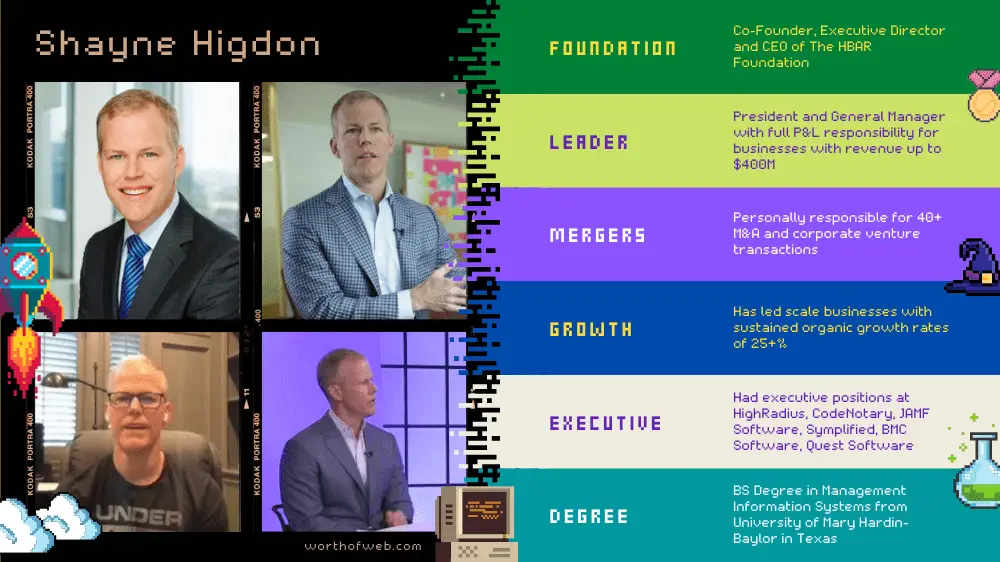
Under the leadership of Shayne Higdon, The HBAR Foundation acts as an integrated force multiplier to help builders and creators overcome the challenges of bringing their ideas to market. If you have a suitable project, you can easily apply for funding.
The Hedera Governing Council has initially earmarked up to 5.35 billion HBARs (approximately 10% of the total HBAR supply) to be transferred to the HBAR Foundation.
Transactions
You can see a level of romanticism within the blockchain communities about how we don’t need enterprises in the blockchain space. People who think like this will be happy if the transactions will be between individuals only.
If you want mass adoption for technology like DLT, you need to find a way to attract enterprises. The big players have some criteria to start developing their applications on DLT networks. A regulated environment, a high level of security in a network, predictable fees, speed, and scalability.
While regulations are still not well-defined, Hedera made its moves considering future regulations. They have been in communication with the regulators and policymakers. So, being regulation-friendly definitely helps Hedera.
When you combine that with other aspects enterprises look for, you can understand why more and more enterprises choose Hedera.
Businesses prefer to predict their cost when they use a network. Fluctuating and brutally high gas fees kill many business ideas. Especially if you are an enterprise trying to make an estimate for your annual budget, you can’t rely on such pricing.
Fixed transaction fees that Hedera provides are the ideal solution for big use cases. Hedera’s fee schedule is set by the Hedera Governing Council and is always based in USD. For example, $0.0001 for getting info, $0.026 for updating a smart contract, or $1.00 for creating a token.
The decision-making and development periods of large enterprises are way longer than small startups. But when they bring their use cases to the main net of a DLT, it creates a sudden jump in transactions. As Mance Harmon says, these “step functions” will show the world what is possible with DLTs, and Hedera will play an important role in this disruption.
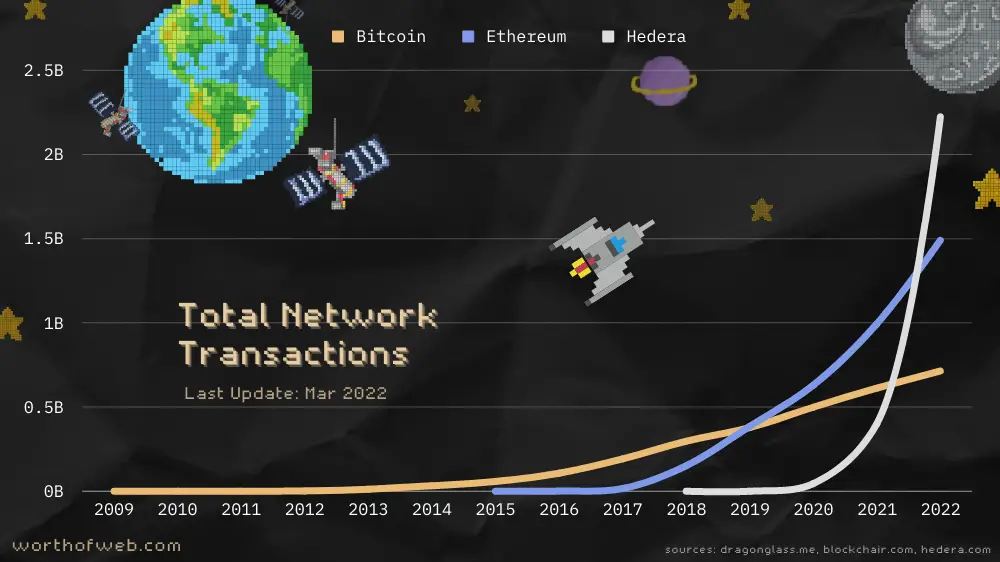
Even with a fraction of all potential enterprises that can use Hedera, their network already crossed 2 billion total mainnet transactions (in 2+ years) while Ethereum is around 1.5 billion (in 6+ years), and Bitcoin around 0.7 billion (in 13+ years).
Blockchain Tetralemma
We have a new idea, a proposal for the blockchain community. What if we add “Green” as a new aspect to the Blockchain Trilemma, and make it Blockchain Tetralemma?
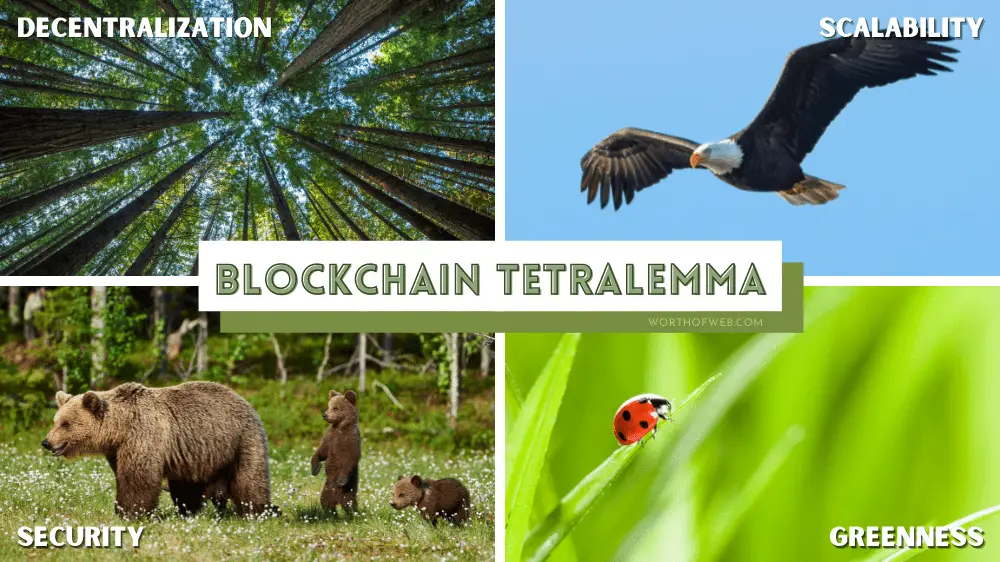
The world needs eco-friendly networks now more than ever. As the adoption of DLTs increases, the energy usage will scare more and more users, organizations, and governments. Many projects try to minimize their carbon footprint. Beating the trilemma became a goal for blockchain development teams. We suggest using “Blockchain Tetralemma” as a standard for evaluation, as a new goal for the development. Decentralization, security, scalability, and greenness. Check our Blockchain Mythology: Trilemma & Tetralemma post to learn more.
Hedera can be our first candidate for this evaluation. How is Hedera doing in terms of being green? Can it pass the Blockchain Tetralemma test?
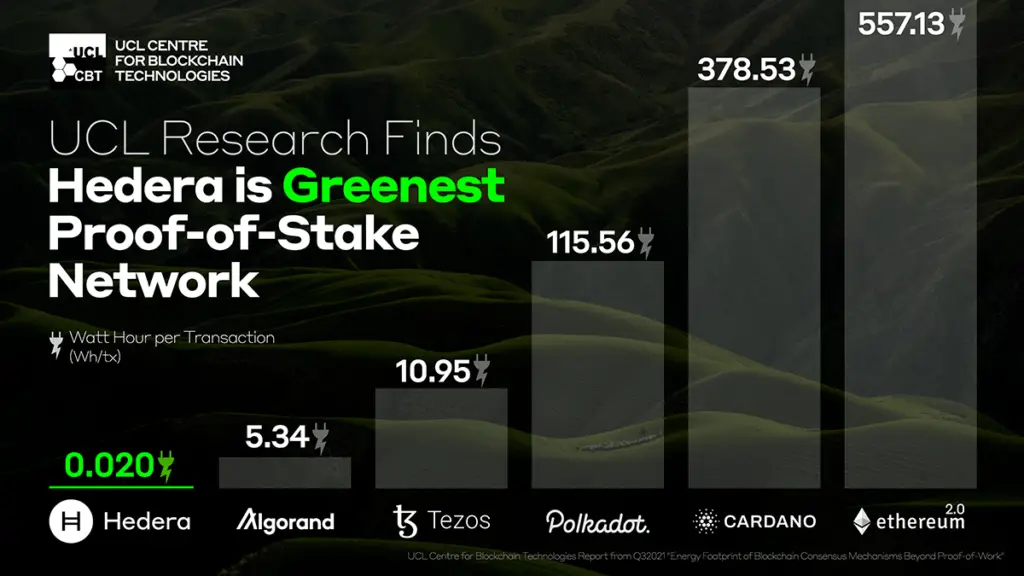
The UCL Centre for Blockchain Technologies team tested various Proof-of-Stake (PoS) networks using a mathematical consumption model that predicts expected energy consumption per transaction, as a function of network load. Hedera was the greenest among networks like Ethereum 2.0, Cardano, Polkadot, Tezos, and Algorand.
As you can see in the report, Hedera needs less energy than the Visa network which is used as an industry benchmark. Besides spending low energy as a network, Hedera also purchases carbon offsets to be carbon negative.
Greenness corner looks good for Hedera. Tetralemma vs Hedera? Who wins? Let us know in the comments section below.
Meanwhile At The Hedera Headquarters
If you want to watch an interview of Hedera founders in a more informal setting and also with personal questions, check the video below.
Max Walker-Williams is doing a great job covering Hedera news and creating “Hedera vs X” comparison videos. Check his YouTube channel for those. Below is Part 1 of the interview at the Hedera headquarters, don’t forget to check Part 2 as well.
